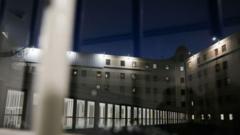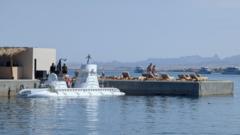In an effort to clamp down on escalating drug-related violence and organized crime, France announced plans to establish a high-security prison in French Guiana, a remote area of the Amazon.
France to Construct High-Security Prison in Amazon to Combat Drug Trafficking

France to Construct High-Security Prison in Amazon to Combat Drug Trafficking
New facility aims to tackle organized crime and drug networks while addressing prison violence and security issues.
The French government is reinforcing its commitment to combat organized crime with a newly proposed high-security prison set for construction in French Guiana. Justice Minister Gérald Darmanin revealed that the facility is designed to hold notorious drug traffickers and radical extremists, with a focus on disrupting the entire drug supply chain.
With a budget of €400 million (£337 million), this state-of-the-art prison aims to open its doors by 2028 and will be located specifically in the isolated territory of Saint-Laurent-du-Maroni. The facility is a reaction to increased violent incidents related to criminal activities in France, which have seen gangs directly targeting prisons and their staff in recent months.
The new prison is set to accommodate up to 500 inmates, featuring a dedicated wing for the most dangerous offenders. Darmanin emphasized that it would enforce a rigid regime to incapacitate major narcotics figures. The prison's remote location is expected to effectively sever communication between inmates and their criminal counterparts on the French mainland.
The French government has faced challenges in containing the inflow of contraband mobile devices into the prison system, escalating their response with new legislation that includes the establishment of a specialized crime investigation unit. This strategy also aims to impose stricter regulations on how inmates communicate with the outside world.
Recent weeks have witnessed increased unrest, with gangs carrying out violent actions deemed "terrorist" by the government, culminating in attacks involving arson and gunfire aimed at correctional facilities. Observers note that these attacks may have been motivated by acts of solidarity towards prisoners' rights.
In constructing the prison at this "strategic crossroads" for drug mules operating between Brazil and Suriname, the French government is responding to a legacy of control difficulties, first spotlighted during the time of the notorious Devil's Island penal colony, an infamous site for incarcerating convicts from 1852 to 1954. This initiative symbolizes a significant step in France's ongoing battle against organized crime within its criminal justice system.
The BBC has reached out to the justice ministry for further insights on this ambitious project and its expected impact on crime rates and prison security in the region.
With a budget of €400 million (£337 million), this state-of-the-art prison aims to open its doors by 2028 and will be located specifically in the isolated territory of Saint-Laurent-du-Maroni. The facility is a reaction to increased violent incidents related to criminal activities in France, which have seen gangs directly targeting prisons and their staff in recent months.
The new prison is set to accommodate up to 500 inmates, featuring a dedicated wing for the most dangerous offenders. Darmanin emphasized that it would enforce a rigid regime to incapacitate major narcotics figures. The prison's remote location is expected to effectively sever communication between inmates and their criminal counterparts on the French mainland.
The French government has faced challenges in containing the inflow of contraband mobile devices into the prison system, escalating their response with new legislation that includes the establishment of a specialized crime investigation unit. This strategy also aims to impose stricter regulations on how inmates communicate with the outside world.
Recent weeks have witnessed increased unrest, with gangs carrying out violent actions deemed "terrorist" by the government, culminating in attacks involving arson and gunfire aimed at correctional facilities. Observers note that these attacks may have been motivated by acts of solidarity towards prisoners' rights.
In constructing the prison at this "strategic crossroads" for drug mules operating between Brazil and Suriname, the French government is responding to a legacy of control difficulties, first spotlighted during the time of the notorious Devil's Island penal colony, an infamous site for incarcerating convicts from 1852 to 1954. This initiative symbolizes a significant step in France's ongoing battle against organized crime within its criminal justice system.
The BBC has reached out to the justice ministry for further insights on this ambitious project and its expected impact on crime rates and prison security in the region.


















